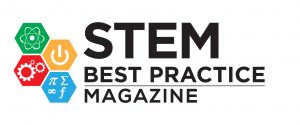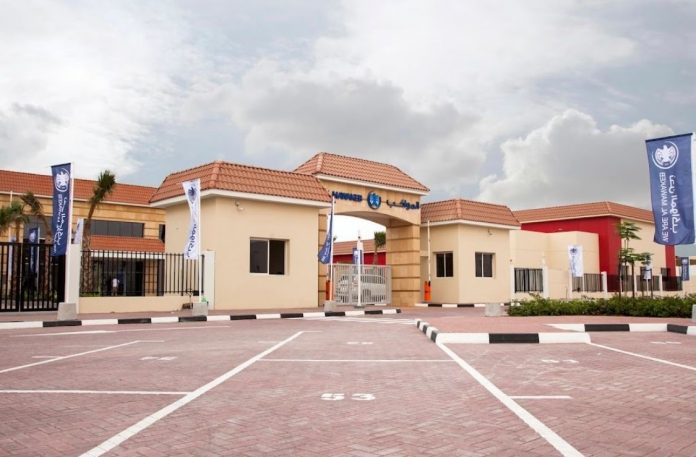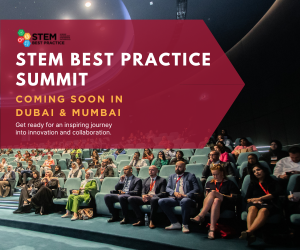About the Author
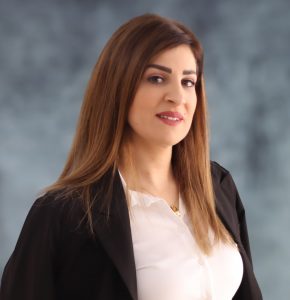
Rasha Bou Karroum, originally from Lebanon, is the Head of the Science Department at Al Mawakeb School Al Khawaneej (AMK). With over 16 years of experience at Al Mawakeb Schools (AMS), Rasha is a lifelong learner who thrives on exploring new ideas and continuous growth. She holds a Master 1 degree in Biochemistry (2008) and a Masters in Educational Leadership and Policy Studies (Fall 2024). Passionate about education and innovation, Rasha is dedicated to fostering a love for science among students and empowering teachers to reach their full potential.
Al Mawakeb School Al Khawaneej (AMK) is dedicated to providing a holistic and dynamic learning environment that promotes both academic excellence and student well-being. The school emphasizes a collaborative approach, where every member of the community—from the principal to the support staff—works together to create an environment conducive to growth and success. The school is dedicated to enhancing student skills, with STEM education serving as a cornerstone for developing critical thinkers and problem-solvers. At AMK, every student is nurtured in an environment where they can excel, supported by a dedicated team working cohesively toward shared success.
STEM (Science, Technology, Engineering, and Mathematics) education is a pillar of the modern educational landscape. At AMK, we go beyond the traditional approach, embedding STEM learning in a way that empowers our students to innovate, solve problems, and engage in real-world applications. Our commitment to STEM education sets us apart as we align our curriculum with the latest trends and challenges, creating a dynamic environment for both students and teachers.
Our Unique Approach to STEM Education: Unlike many schools that follow a standard curriculum, we take a personalized, integrated approach to STEM. Each STEM activity is thoughtfully designed to connect multiple disciplines, ensuring that students understand the interconnectedness of science, technology, engineering, and math. Our curriculum isn’t just about teaching concepts—it’s about applying these concepts in ways that inspire creativity, critical thinking, and collaboration.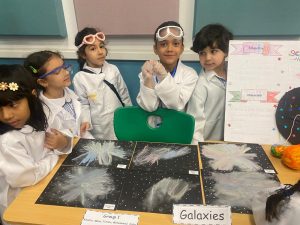
- Interdisciplinary Learning: We integrate subjects, enabling students to see how scientific concepts intersect with technological tools, engineering challenges, and mathematical problem-solving. This holistic approach equips students with the tools needed for the 21st century.
- Project-Based Learning (PBL): Our students are encouraged to participate in hands-on projects where they apply their knowledge to solve real-world problems. This not only deepens their understanding but also prepares them for future challenges.
- Integration of STEAM: In addition to STEM, we incorporate the arts to foster creativity and enhance the design and innovation aspects of our projects. The STEAM exhibitions showcase this blend, allowing students to exhibit projects that combine aesthetics with engineering and technological precision.
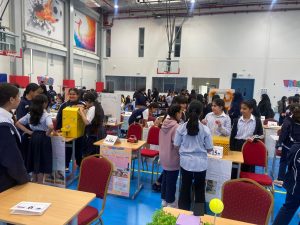
Encouraging Students Through STEM Competitions: Competitions play a significant role in our STEM education. By participating in national and international challenges, our students are exposed to a global platform where they can showcase their talents, collaborate with peers, and gain confidence.
- Global Exposure: We strongly encourage students to participate in distinguished STEM competitions, where they collaborate with international peers and push the boundaries of their problem-solving abilities.
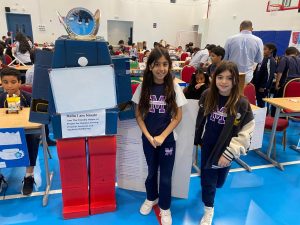
- Skills Development: Through these competitions, students develop vital skills such as teamwork, problem-solving, time management, and communication—all essential for their future success in STEM fields.
Creating STEM-Engaged Activities: Our teachers are key to fostering a stimulating learning environment. They design activities that are both challenging and engaging, ensuring students are motivated to explore the subjects deeply. Some examples include:
- Inquiry-Based Learning: Teachers encourage students to ask questions, conduct experiments, and engage in problem-solving activities. Inquiry-based learning is at the heart of how we teach STEM, leading students to discover answers through exploration.
- Technology Integration: From coding lessons to robotics clubs, our teachers incorporate the latest technologies into their lessons, ensuring students are familiar with cutting-edge tools and software.
- Cross-Grade Collaboration: One of the distinctive features of our school is the collaboration between different grade levels. For example, high school students mentor younger students in STEM projects, creating a culture of collaboration and peer learning.
Curriculum Alignment and Keeping Up-to-Date: We ensure that our curriculum is aligned with both NGSS standards and global STEM trends. Our teachers undergo continuous professional development to stay informed about the latest educational tools and strategies.
- Teacher Training and Professional Development: Teachers at AMK regularly attend workshops and webinars to enhance their knowledge of STEM education. This enables them to bring the latest innovations into the classroom.
- Real-World Connections: We partner with industry leaders, universities, and STEM professionals to provide students with real-world connections. Guest lectures, field trips, and internships are part of the learning journey.
- Adaptability: Our curriculum is designed to be flexible, allowing us to incorporate emerging trends such as AI, data science, and renewable energy. This ensures that students are learning about the technologies shaping the future.
Success Criteria and Student Achievements: The success of our STEM program is evident in the accomplishments of our students. We measure success not only by test scores but also by the innovative projects our students create, their participation in competitions, and the skills they develop.
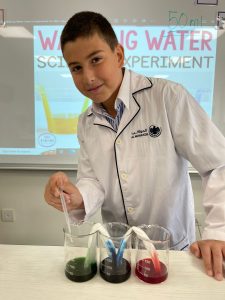
- Innovative Projects: Students at AMK have developed many projects, which have been recognized for their ingenuity and impact.
- Competition Success: Many of our students have won awards in international STEM competitions, showcasing the effectiveness of our hands-on approach.
- Post-School Success: Graduates from our school have gone on to pursue higher education in prestigious universities and have been successful in securing careers in STEM fields.
At AMK, STEM education is more than just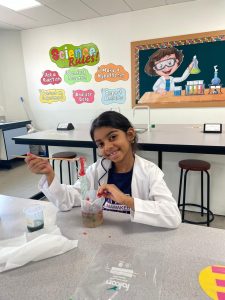 a curriculum—it’s a transformative experience that prepares students to be the innovators of tomorrow. By fostering creativity, encouraging collaboration, and keeping pace with global trends, we ensure that our students are not only ready for the future but are equipped to shape it. Our success is reflected in our students’ achievements, the projects they create, and the positive impact they have on the world.
a curriculum—it’s a transformative experience that prepares students to be the innovators of tomorrow. By fostering creativity, encouraging collaboration, and keeping pace with global trends, we ensure that our students are not only ready for the future but are equipped to shape it. Our success is reflected in our students’ achievements, the projects they create, and the positive impact they have on the world.
Implementing Science and Engineering Practices (SEP) from KG to Grade 12:
At AMK, we emphasize the 8 Science and Engineering Practices (SEP) as outlined in the Next Generation Science Standards (NGSS), ensuring a continuous and coherent learning journey from kindergarten through Grade 12. These practices are integral to our approach, providing students with a strong foundation in scientific thinking, problem-solving, and engineering design.
The 8 practices we embed across all grades are:
- Asking questions and defining problems
- Developing and using models
- Planning and carrying out investigations
- Analyzing and interpreting data
- Using mathematics and computational thinking
- Constructing explanations and designing solutions
- Engaging in argument from evidence
- Obtaining, evaluating, and communicating information
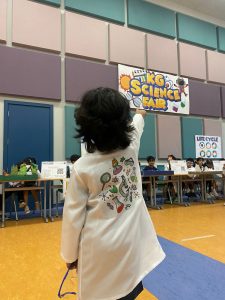
From KG, our students begin by asking simple questions and engaging in inquiry-based learning. As they progress through the grades, the complexity of tasks increases, moving from basic investigations to designing models, solving engineering problems, and developing scientific arguments based on evidence. For instance, our younger students might work on simple hands-on projects like building basic structures, while high school students tackle real-world issues such as designing energy-efficient buildings or creating data models to predict environmental changes.
Daily and Weekly Assessments: Teachers regularly assess these practices through both formative and summative assessments. They observe and evaluate how students engage with SEP in various activities, ensuring that all students are developing the necessary skills. Weekly assessments may involve reflective tasks, lab investigations, or student-led discussions, while daily tasks could be in-class experiments, group problem-solving, or individual research projects.
Engaging Students in Real-World Scenarios: To further cultivate critical thinking, we use real-world debates, scenarios, and problem-solving tasks. For example, in middle school, students might engage in a debate on renewable vs. non-renewable energy sources, while high school students might tackle case studies on climate change or medical ethics. These debates and discussions encourage students to evaluate different perspectives, construct arguments, and find innovative solutions.
In addition, our problem-solving tasks challenge students to think like scientists and engineers. For instance, students are often presented with hypothetical but realistic problems, such as designing sustainable urban spaces or creating solutions to water scarcity. Through these activities, they apply their knowledge, think critically, and collaboratively propose solutions.
Participation in Competitions and Symposia:
Our students are regularly involved in prestigious global events that showcase their skills and knowledge. For example:
GITEX (Gulf Information Technology Exhibition): Our students participated in GITEX, where they presented projects on artificial intelligence, robotics, and smart city solutions. This provided them with a platform to showcase their technological innovations on a stage.
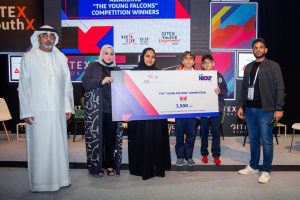
- Science Symposium: Students also participate in science symposia, presenting research and engaging in discussions with industry experts and fellow young scientists.
- Other Competitions: In addition to GITEX and science symposia, our students are active in various STEM competitions and challenges, where they apply their learning to solve complex problems and receive feedback from professionals in the field.
These opportunities not only enhance their learning but also allow them to gain recognition and confidence in their abilities.
Connecting STEM Activities to the UAE’s Vision and Challenges:
At AMK, we ensure that our STEM activities are relevant not only to global trends but also to the unique context and needs of the UAE. We align our projects with the nation’s vision for sustainability, technological innovation, and space exploration, encouraging students to contribute to the country’s future.
- Sustainability and Renewable Energy:
In line with the UAE’s commitment to sustainability, especially with projects like Masdar City and the country’s renewable energy goals, our students regularly engage in projects that explore clean energy solutions. For example, high school students have worked on designing solar-powered desalination plants, while middle school students have conducted studies on the use of wind and solar power in the UAE’s desert environment. These activities help students understand how they can contribute to the UAE’s goal of achieving net-zero emissions by 2050. - Space Exploration:
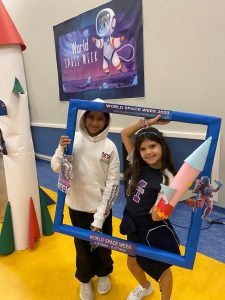 The UAE’s ambitious space exploration program, including the Mars Hope Probe mission, serves as an inspiration for many of our STEM projects. In collaboration with UAE’s space initiatives, our students have designed prototypes of space habitats for Martian living conditions and participated in simulations that explore the logistics of space travel. This not only excites students about the UAE’s role in space science but also encourages them to think creatively about the challenges of space exploration.
The UAE’s ambitious space exploration program, including the Mars Hope Probe mission, serves as an inspiration for many of our STEM projects. In collaboration with UAE’s space initiatives, our students have designed prototypes of space habitats for Martian living conditions and participated in simulations that explore the logistics of space travel. This not only excites students about the UAE’s role in space science but also encourages them to think creatively about the challenges of space exploration. - Water Conservation and Desert Agriculture:
Given the UAE’s arid climate, water conservation is a critical issue, and many of our projects focus on finding innovative solutions to address water scarcity. Students have developed models for smart irrigation systems that can be used in desert agriculture, mimicking the UAE’s efforts in modernizing farming through technology. Elementary students might investigate how plants in the UAE survive in harsh conditions, while older students design hydroponic systems that could improve food security in desert climates. - Smart Cities and Technological Innovation:
With the UAE’s focus on building smart cities, like Dubai’s Smart City initiative, our students frequently engage in projects related to artificial intelligence and urban planning. For example, our students have developed apps to monitor and reduce energy consumption in buildings, or designed smart traffic systems aimed at reducing congestion in growing cities like Dubai and Abu Dhabi.
Participation in STEM Careers Events and AMIDEAST STEM Programs:
To further expose our students to real-world applications and career opportunities, they participate in STEM Careers Events and AMIDEAST STEM programs. These programs connect students with industry professionals, offering insights into various STEM fields such as engineering, healthcare, and information technology. By attending these events, students gain a deeper understanding of potential career paths in the UAE and abroad, which motivates them to apply their classroom learning to real-world challenges.
- STEM Careers Events:
Our students have attended various career fairs and STEM events, where they meet professionals from leading industries. These events offer practical insights into the UAE’s growing STEM sectors, and students receive guidance on how to pursue successful careers in fields such as AI, engineering, biotechnology, and environmental science. - AMIDEAST STEM Programs:
Through their participation in AMIDEAST’s STEM programs, students engage in hands-on workshops, research projects, and mentorship opportunities. These programs not only enhance their academic knowledge but also equip them with the critical thinking and problem-solving skills needed to thrive in competitive STEM careers. The collaboration with AMIDEAST allows students to explore cutting-edge fields like renewable energy, space science, and robotics, aligning with the UAE’s vision for technological advancement.
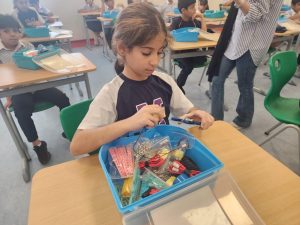
By tying our STEM curriculum to these real-world challenges and opportunities in the UAE, we empower students to think critically about their local environment and contribute meaningfully to the nation’s development. These connections not only enhance students’ engagement but also prepare them to be future leaders in the UAE’s rapidly evolving STEM sectors.
